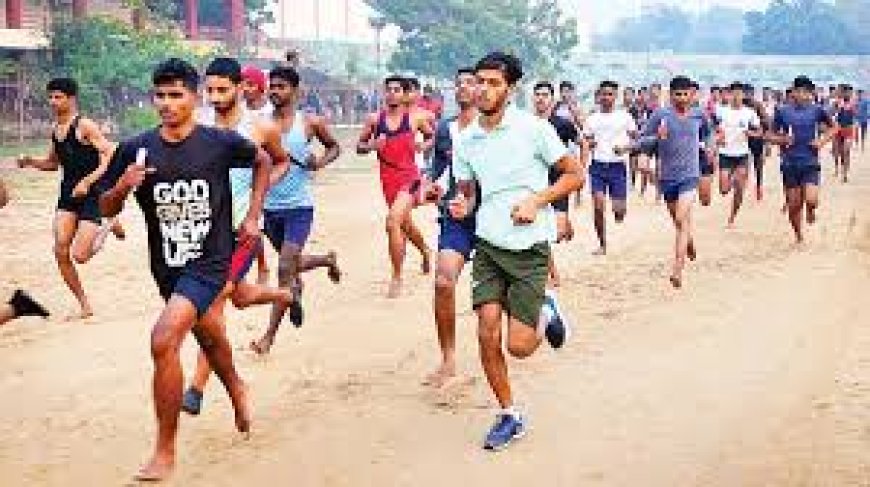BROKEN PROMISES OF THE AGNIPATH SCHEME: JOB INSECURITY AMONG YOUTH
The "Agnipath" scheme, touted as an employment boon, has sparked controversy for its detrimental impact on India's unemployed youth and national security. Under this system, only 10,000 out of 40,000 recruits will have jobs after four years, leaving 75% without employment or pension benefits. The policy's effects, including riots in states like Bihar and Uttar Pradesh, are compounded by recent changes in Railway Recruitment Board criteria. Critics, including Rahul Gandhi, condemn the scheme as a betrayal of patriotic youth, with concerns raised about the army's professionalism and readiness. Congress President Mallikarjun Kharge has called for intervention to address the plight of over two lakh aspiring recruits, highlighting broader shifts towards contractualization and reduced social benefits in government employment.

Outrage and Unmet Expectations
'Agnipath' is a layoff strategy that harms India's unemployed and jeopardizes national security. The usual annual open recruiting of approximately 40,000 soldiers will now take place under the Agnipath system. The main distinction is that just 10,000 of the entrants will still have work after four years, while the remaining 30,000 will be ruthlessly laid off. As a result, it is a strategy that generates only 10,000 employees every year, as opposed to the previous 40,000. It also jeopardizes national security because the Army will increasingly rely on a large number of poorly trained, contractually hired soldiers. Nonetheless, this employment reduction strategy is being touted as a fantastic employment development. Even the partial fulfillment of resolving the long-standing backlog of one million jobs in various government departments are being advertised as creating new jobs.
Although the larger economic motives and social imperatives driving the Agnipath project are not fully understood by the general public, the scheme's impact, which excludes candidates over the age of 21 and leaves 75% of applicants jobless after four years without pension benefits, has sparked outrage among those who were eagerly awaiting the recruitment call. The administration has responded to the anger on the streets by lowering the age limit to 23 for this year, but this will not extinguish the flame that the policy ignited because it does not address the primary issue of what happens to the recruits four years later.
The Indian Army and Railways, in addition to migrating to work in the informal sectors of western and southern states, are key employers in states such as Bihar, Uttar Pradesh, and Haryana, where unemployment riots have broken out. In contrast to the idealistic middle-class notion of serving the country, being a soldier is a matter of daily food for the poor.
The Agnipath blow came months after the Railway Recruitment Board revised its eligibility criteria, leaving lakhs of candidates high and dry. With the agricultural and unorganized sectors, which provide work for the unemployed, severely impacted by demonetization, goods and services tax, and later COVID-19 and Modi's lockdowns, northern Indian youth have placed all their hopes in army enlistment.
Rahul Gandhi's Critique and Political Response towards "Agnipath Scheme"
In a post on X (previously Twitter), Rahul Gandhi said, "Leaving 1.5 lakh youth already selected in the armed forces helpless in the name of a temporary recruitment Agneepath scheme is a grave injustice to them. The Agneepath scheme is a betrayal not only of the patriotic youth but also of the sacred sentiments of the country attached to the Indian Army." Rahul Gandhi commented while on his 'Bharat Jodo Nyay Yatra' in Bihar's Katihar, during an interaction with several eager youths who had worked hard for years to join the army.
The entire idea fails to pass even basic inspection under any circumstance, least of all national security. Agnipath fails to explain how an army can remain fit and professional when half of its men will be on brief 'tours of duty' by 2032, according to Lieutenant General B.S. Raju. According to another army veteran, the Indian Army would become a 'kindergarten' force, with most soldiers having no incentive to invest in learning or take risks.
On February 26, Congress President Mallikarjun Kharge pleaded with Indian President Draupadi Murmu to intervene so that over two lakh young people might be drafted into the military before the start of the Agneepath program. These young people have been chosen for military recruiting. Congressman Rahul Gandhi addressed the issue and stated, "We are with the candidates in this fight for justice." While posting Congress President Mallikarjun Kharge's letter to the Honorable Madam President on social media, the letter discussed the 2 lakh young people who were chosen for the armed services but were not recruited despite their hard work and participation in the Agniveer Yojana.
Conclusion
The state's role was redesigned as a facilitator, and private capital was tasked with generating growth and creating jobs, although government spending is a primary source of growth, progress, and survival in developing nations. Revolutionary employment policies, which have failed in this endeavor, are being applied in all sectors, including the contractualization of the Agnipath scheme, fixed-term employment, and removing social benefits. Additionally, hiring practices in the government have shifted to being more provisional, contractual, and without pension-beneficial.
-
ADITYA ALIA
What's Your Reaction?






























